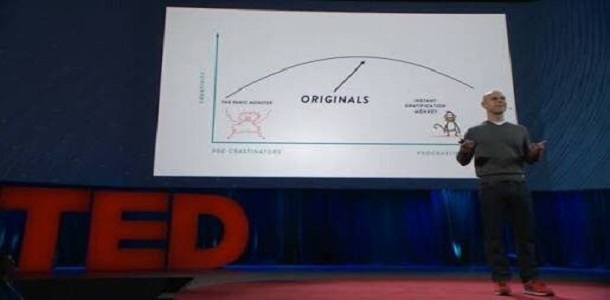Do you dream of success, but don’t know how to achieve it?
Does your ultimate goal seem out of reach?
Do you look at other people who make it happen with a snap of their fingers and wonder what’s their secret?
Look no further — below we list the 4 habits you should adopt for success, as surprising as they may sound!
How to become an “original”
In a fascinating yet entertaining TED talk, top-rated professor in organizational psychology Adam Grant explains how you can become what he calls an “original”:
“Originals are nonconformists, people who not only have new ideas but take action to champion them. They are people who stand out and speak up. Originals drive creativity and change in the world. They’re the people you want to bet on. And they look nothing like I expected. I want to show you today three things I’ve learned about recognizing originals and becoming a little bit more like them.”
So what are these 3 surprising habits we need to adopt to become an original ourselves?
1. Be quick to start but slow to finish
Are you someone that always puts off tasks, doing zillions of things before you get started on what you need to do? Congratulations, you have a habit in common with an original.
On the opposite side, are you someone that always gets started on deadlines immediately? You may want to change your approach, because procrastination is actually beneficial to the creative process.
As professor Grant puts it: “It turns out the first-mover advantage is mostly a myth. Look at a classic study of over 50 product categories, comparing the first movers who created the market with the improvers who introduced something different and better. What you see is that the first movers had a failure rate of 47 percent, compared with only 8 percent for the improvers.
Look at Facebook, waiting to build a social network until after Myspace and Friendster. Look at Google, waiting for years after Altavista and Yahoo. It’s much easier to improve on somebody else’s idea than it is to create something new from scratch.
So the lesson I learned is that to be original you don’t have to be first. You just have to be different and better.”
2. Use your doubts to motivate yourself
Does it seem to you that successful people always look confident, while you’re full of doubt?
Don’t be fooled — many originals may have a strong appearance, but they have exactly the same doubts as you and I have. They just manage it differently.
First of all, it’s important to discern two different kinds of doubt: self-doubt and idea doubt.
“Self-doubt is paralyzing. It leads you to freeze. But idea doubt is energizing. It motivates you to test, to experiment, to refine”, professor Grant explains.
So use your idea doubts to explore different avenues and experiment to find the best option. When you do that, you’ll open yourself for what Grant calls “vuja de”, the opposite of déjà vu:
“Vuja de is when you look at something you’ve seen many times before and all of a sudden see it with fresh eyes. It’s a screenwriter who looks at a movie script that can’t get the green light for more than half a century. In every past version, the main character has been an evil queen. But Jennifer Lee starts to question whether that makes sense. She rewrites the first act, reinvents the villain as a tortured hero and Frozen becomes the most successful animated movie ever. So there’s a simple message from this story. When you feel doubt, don’t let it go.”
3. Embrace the fear of failing
So great news, having doubts is a good thing! And it gets better — so is having fear.
It turns out that originals are afraid too, but they know that in the long run, our biggest regrets are not our actions but our inactions.
As Professor Grant explains: “Elon Musk told me recently, he didn’t expect Tesla to succeed. He was sure the first few SpaceX launches would fail to make it to orbit, let alone get back, but it was too important not to try. And for so many of us, when we have an important idea, we don’t bother to try. But I have some good news for you. You are not going to get judged on your bad ideas.”
That’s right, the most successful people are the ones who fail the most, because they’re the ones who try the most. Look at some of the biggest geniuses of classical music for example — Bach, Beethoven, Mozart — who generated hundreds of compositions to come up with a much smaller number of masterpieces.
Keep these hacks in mind whenever you feel doubtful or afraid about your next dream project:
“Know that being quick to start but slow to finish can boost your creativity, that you can motivate yourself by doubting your ideas and embracing the fear of failing to try, and that you need a lot of bad ideas in order to get a few good ones.”
Become one of the originals you admire. Don’t follow, but drive the change in the world.

